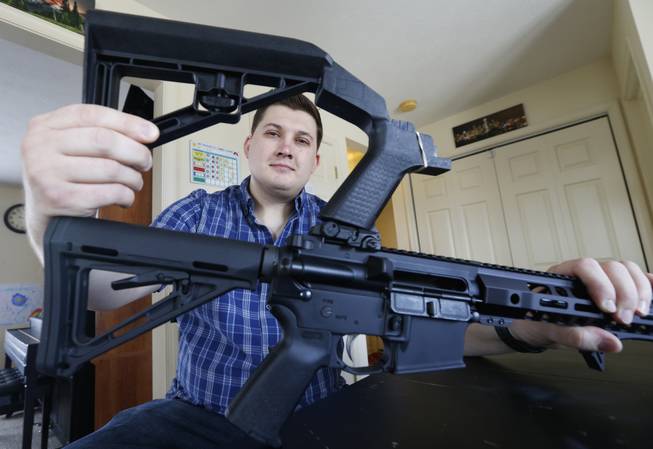High court can ensure that Oct. 1 doesn’t happen again
High Court #HighCourt


Steve Helber / AP
In this March 15, 2019, photo, Ryan Liskey displays a bump stock on top of his AR-15 at his home in Harrisonburg, Va.
Wednesday, Feb. 28, 2024 | 2 a.m.
Often, when people think of Las Vegas, they think of the glam. To me, it has always just felt like home.
I moved here when I was 5 and I’ve lived here for nearly four decades since. I grew up going to UNLV basketball games when Coach Jerry Tarkanian led the Runnin’ Rebels to four trips to the Final Four. I went to high school here and to UNLV for my undergrad and master’s. I always felt a sense of community here — and it made me feel safe.
That changed Oct. 1, 2017, at the Route 91 Harvest festival, when a gunman, using 14 AR-style rifles equipped with bump stocks, killed 58 people that night, wounded at least 400 more, and traumatized me, my sister, my family and my town forever.
Surviving gun violence — among other things — means lingering, haunting questions. Even seven years later, it’s unbelievable to me how things happen the way they do. What if my sister Geena, our friends and I had stayed closer to the stage, instead of going in search of fried Oreos? What if we dove to the ground a few inches to the right? What if we had been trampled in the pandemonium as we ran from automatic gunfire? What if a manager at the MGM Grand hadn’t let us through a side door, giving us sanctuary while we waited for our dad to pick us up? What if Geena hadn’t offered me a last-minute ticket to go, and I had never even been there at all?
As a clinical social worker, I spend my days working with people living with trauma from acts of violence or abuse. Professionally, I know that experiencing violence leaves survivors with different patterns of fear and coping. Personally, it’s a different story. It’s been hard for me to reconcile all the ways the shooting continues to affect my life, my family and my community at-large.
Like other survivors, fear and hypervigilance influence my behavior and decisions. My two young children are jumpy and reactive to loud noises, having seen that behavior from me. My sister and parents live with emotional and physical trauma. And far too many across Las Vegas, from those whose friends or family were shot and killed, who fled in terror or sheltered screaming concert-goers, or those who first responded to the scene, will forever live with the lifelong impacts the same way that I do.
Too many stomachs drop when breaking news alerts go off on phones about a shooting in the area. Too many palms start sweating when schools go on lockdowns due to an active shooter threat. And too many of us will have trouble sleeping tonight, after the U.S. Supreme Court hears oral arguments today in Garland v. Cargill.
After the Oct. 1 shooting, the Bureau of Alcohol, Tobacco, Firearms and Explosives (ATF) issued a new rule to prohibit the production, sale and possession of bump stocks, which are deadly accessories that essentially turn rifles into functioning machine guns.
Yes, machine guns.
Immediately after the ATF finalized this lifesaving new rule, the gun lobby filed suit to block it. Enter the Fifth Circuit Court of Appeals — the gun lobby’s favorite appeals court — which ruled to overturn the prohibition, effectively legalizing bump stocks in Texas, Louisiana and Mississippi. Now, the Supreme Court has agreed to take up the case. Its decision will determine whether these brutal accessories are once again allowed to flood our nation’s streets.
America has seen just how deadly it can be when someone has easy access to weapons of war. We all live in fear that a mass shooting can break out anywhere at any time in this country. The gun lobby would prefer us to believe that mass shootings are inevitable acts of nature rather than entirely preventable tragedies. It would also like us to believe that weapons and accessories have no impact on the death toll of a mass shooting. But my sister and I — and far too many Las Vegans — saw first-hand how much more deadly a mass shooter can be when they have access to bump stocks.
There is no reason anyone should be able to easily accessorize a weapon to fire 800 rounds per minute. Banning bump stocks has been — and should continue to be — a bipartisan issue. Following the Oct. 1 shooting, in addition to movement from the Trump administration, Republican governors in Massachusetts, Florida, Maryland and Vermont signed legislation to ban these deadly accessories of war. Because it’s common sense.
My life changed forever after the shooting, but advocating for gun violence prevention with Moms Demand Action has allowed me to put my trauma into action. Now, I’m using my voice to urge the Supreme Court to reverse the Fifth Circuit’s extreme decision and protect our communities, because no other concerts need to become battlegrounds.
Marisa Marano is a clinical social worker, Las Vegas resident and survivor of the Route 91 Harvest shooting.